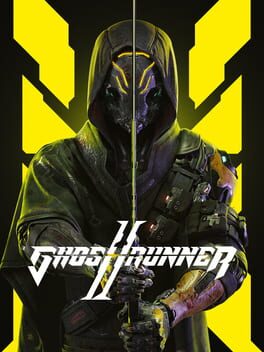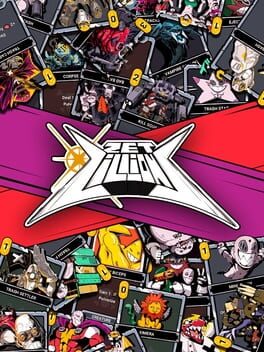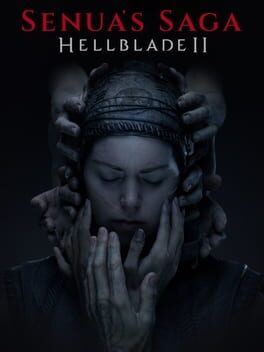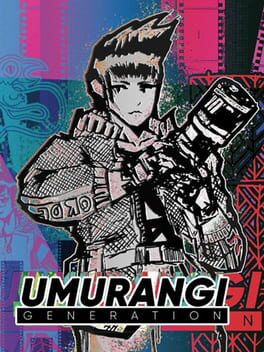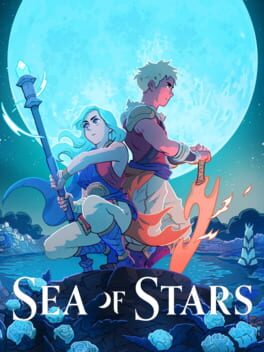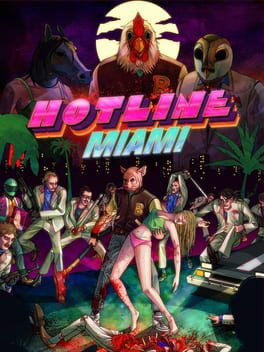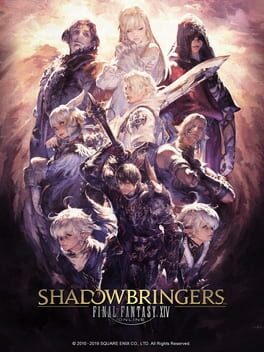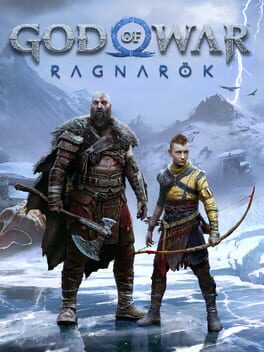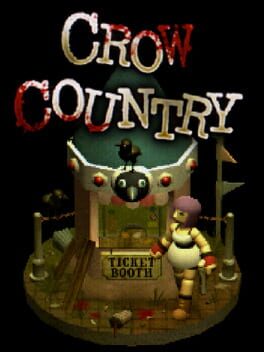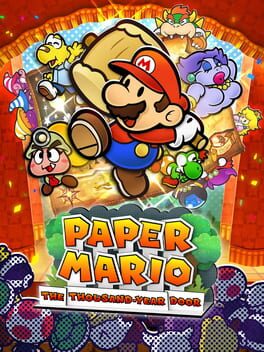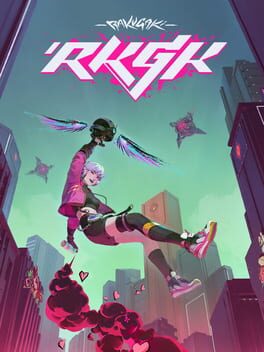phoenixstarship
382 Reviews liked by phoenixstarship
Ghostrunner II
2023
Based on what people have been saying about Ghostrunner II, I was expecting just more of the same, except not quite as cohesive as the first game.
After rolling credits on it last night, however, I have to say that I dug it way more than its predecessor. This isn't just me being a contrarian for the sake of it, either, because I can see where and why many took issue with this game, but a lot of those same points of contention are perhaps what I enjoyed most out of Ghostrunner 2 compared to the first one.
For one, I vibed way more with the art direction this time around, despite it taking place in the same city as the previous one. You get to visit new parts of it, including a vast derelict cathedral and, of course, the world outside the tower, even though I don't disagree with the complaints of the latter looking too bland and samey. Really, it's just nice to have a consistent change in pace throughout, at least visually.
This also extends to gameplay, as there are new mechanics and fresh spins on existing ones this time around. They're all pretty fun to use, and you're given at least one new toy to play with at every level. The environments are also a lot more spacious this time around, and you're given way more room to breathe in regards to traversal, both in and out of combat, than you were before.
As I've hinted, roughly halfway through Ghostrunner II, you venture into the world outside the tower, much of which takes the form of riding a motorbike across open-ended levels. It's clear that this is the point where Ghostrunner II falls apart for many people since it kind of becomes a different kind of game at the halfway point, but as I've said, I actually really dug it. Not just for the change of pace, but also for the great set pieces and vistas you're treated to at this part of the game. One particular level involves you tussling with a giant tunneling worm-like machine, which, oddly enough, was reminiscent of the vehicle levels in James Bond games, where, even though it's heavily scripted, the way it all comes together is wildly engaging.
Once again, though, the story is decent, and yet, the way it is delivered leaves much to be desired. One of my critiques of the previous game is how disconnected the narrative was from the overall gameplay. Here, however, it seems they've overcorrected in order to alleviate this. Between every level, you visit a small hub where you can chat with people and upgrade yourself before moving on to the next mission. It seems like a fine idea at first, but you find yourself skipping through much of it just to get to the next mission.
The first boss battle is also needlessly frustrating and sets a false precedent for the rest of the game's otherwise good boss battles. In fact, you'll no doubt have more trouble defeating the first boss than the final boss. Not that it isn't tricky, but more that the first one requires split-second movements and very specific timing in a way that harkens back to the frantic nature of the first game.
Still, these issues don't disrupt the whole thing, and Ghostrunner II is still a damn fine sequel that towers above the original (at least for me). There are, of course, still some qualms that One More Level would need to reevaluate should they continue the series, but otherwise, I'm thoroughly impressed with their work here.
8/10
After rolling credits on it last night, however, I have to say that I dug it way more than its predecessor. This isn't just me being a contrarian for the sake of it, either, because I can see where and why many took issue with this game, but a lot of those same points of contention are perhaps what I enjoyed most out of Ghostrunner 2 compared to the first one.
For one, I vibed way more with the art direction this time around, despite it taking place in the same city as the previous one. You get to visit new parts of it, including a vast derelict cathedral and, of course, the world outside the tower, even though I don't disagree with the complaints of the latter looking too bland and samey. Really, it's just nice to have a consistent change in pace throughout, at least visually.
This also extends to gameplay, as there are new mechanics and fresh spins on existing ones this time around. They're all pretty fun to use, and you're given at least one new toy to play with at every level. The environments are also a lot more spacious this time around, and you're given way more room to breathe in regards to traversal, both in and out of combat, than you were before.
As I've hinted, roughly halfway through Ghostrunner II, you venture into the world outside the tower, much of which takes the form of riding a motorbike across open-ended levels. It's clear that this is the point where Ghostrunner II falls apart for many people since it kind of becomes a different kind of game at the halfway point, but as I've said, I actually really dug it. Not just for the change of pace, but also for the great set pieces and vistas you're treated to at this part of the game. One particular level involves you tussling with a giant tunneling worm-like machine, which, oddly enough, was reminiscent of the vehicle levels in James Bond games, where, even though it's heavily scripted, the way it all comes together is wildly engaging.
Once again, though, the story is decent, and yet, the way it is delivered leaves much to be desired. One of my critiques of the previous game is how disconnected the narrative was from the overall gameplay. Here, however, it seems they've overcorrected in order to alleviate this. Between every level, you visit a small hub where you can chat with people and upgrade yourself before moving on to the next mission. It seems like a fine idea at first, but you find yourself skipping through much of it just to get to the next mission.
The first boss battle is also needlessly frustrating and sets a false precedent for the rest of the game's otherwise good boss battles. In fact, you'll no doubt have more trouble defeating the first boss than the final boss. Not that it isn't tricky, but more that the first one requires split-second movements and very specific timing in a way that harkens back to the frantic nature of the first game.
Still, these issues don't disrupt the whole thing, and Ghostrunner II is still a damn fine sequel that towers above the original (at least for me). There are, of course, still some qualms that One More Level would need to reevaluate should they continue the series, but otherwise, I'm thoroughly impressed with their work here.
8/10
Zet Zillions
2024
Usually, when i play a game for the first hour-hour and 30 minutes, i get a general consensus as to what my experience with the game will be for the rest of the playthrough.
For a game like this, i'd like to use the example of God Of War 2018.
It started off slow, walking for a while, lots of cinematic presentation going on for roughly 10 minutes.
Then the central gameplay started and it was fun and intense, continuing to the first sets of enemies and the first tutorial boss.
Then it transitioned into walking for abit, a cutscene, and after about 10 minutes i i was starting to think "perhaps this game will just be cutscenes and small gameplay segments unrelated to each other" until the real first boss appeared, testing everything i learned up until that point and pushing away that mindset i had beforehand.
An hour in and i have gotten a consensus that this game will be just as entertaining if not more for the rest of the playthrough after this.
The reason im describing my experience with GOW 2018 is to relate it to my experience with Hellblade 2.
See, while GOW's first hour had intense fights, emotional cutscenes and an incredible boss fight to cap it off, Hellblade 2 tries to do that, but fails in so many ways.
First the walking aspect i mentioned beforehand, while abit of a nuisance in GOW, is showcased to its fullest effect in Hellblade 2 to an absolutely embarrassing amount.
The first 35 minutes were watching a cinematic, walking, watching cutscene, walking, hearing voices and walking.
It's as if the developers misunderstood why the walking in GOW worked, because it was offset by gameplay that interacted with the player, which brings me to my next point.
The gameplay itself is the most bare bones, safe, and easy "gameplay" system i've ever interacted with, to the point i can safely say the game plays itself.
You fight a single enemy at a time, the enemies themselves swing their swords which apparently weigh 30kg so slowly that i could quite literally walk BACKWARDS and the enemy could not hit me.
When you hit the enemy, and i was playing on the hardest difficulty mind you, 3 FULL TIMES you win, it doesnt matter which enemy you do it on unless there's a fucking bear i could've fought later on.
Thats not all by the way, you also have a parry, the window of that parry is so enormously large that i ACCIDENTALLY did it while figuring out the controls. Doesn't help that parrying allows you to hit the enemy 3 times again to end the fight before it even had a chance to start.
After all that, after all that walking and voice talking and boring bland cutscenes held up only by incredible performances, i atleast expected the first boss fight to give me some kind of challenge.
You can't imagine my disappointment when i realized "oh they really didn't try".
Parry, hit 3 times, cutscene, parry/dodge the slowest attack known to man, hit 3 times, cutscene, ending with parry, hit 3 times, cutscene, win.
This and Starfield are the biggest disappointments of the year for me, 2 games that i expected so much more from brought down to simplistic games lacking any kind of imagination, with bare bones gameplay and design lacking more depth than a fucking playstation 1 game.
I feel sorry for Ninja Theory, because i've been playing Heavenly Sword recently and while it has some problems, it showed me that Ninja Theory can somehow make a good game with decent gameplay,
and i'm sad that this game might be the reason for Microsoft shutting them down in the near future, like how they shut down Arkane and Tango Gameworks.
And even with that impending closure to another studio held by a greedy and uncaring company, i cannot recommend nor will i ever plan to replay Hellblade 2.
For a game like this, i'd like to use the example of God Of War 2018.
It started off slow, walking for a while, lots of cinematic presentation going on for roughly 10 minutes.
Then the central gameplay started and it was fun and intense, continuing to the first sets of enemies and the first tutorial boss.
Then it transitioned into walking for abit, a cutscene, and after about 10 minutes i i was starting to think "perhaps this game will just be cutscenes and small gameplay segments unrelated to each other" until the real first boss appeared, testing everything i learned up until that point and pushing away that mindset i had beforehand.
An hour in and i have gotten a consensus that this game will be just as entertaining if not more for the rest of the playthrough after this.
The reason im describing my experience with GOW 2018 is to relate it to my experience with Hellblade 2.
See, while GOW's first hour had intense fights, emotional cutscenes and an incredible boss fight to cap it off, Hellblade 2 tries to do that, but fails in so many ways.
First the walking aspect i mentioned beforehand, while abit of a nuisance in GOW, is showcased to its fullest effect in Hellblade 2 to an absolutely embarrassing amount.
The first 35 minutes were watching a cinematic, walking, watching cutscene, walking, hearing voices and walking.
It's as if the developers misunderstood why the walking in GOW worked, because it was offset by gameplay that interacted with the player, which brings me to my next point.
The gameplay itself is the most bare bones, safe, and easy "gameplay" system i've ever interacted with, to the point i can safely say the game plays itself.
You fight a single enemy at a time, the enemies themselves swing their swords which apparently weigh 30kg so slowly that i could quite literally walk BACKWARDS and the enemy could not hit me.
When you hit the enemy, and i was playing on the hardest difficulty mind you, 3 FULL TIMES you win, it doesnt matter which enemy you do it on unless there's a fucking bear i could've fought later on.
Thats not all by the way, you also have a parry, the window of that parry is so enormously large that i ACCIDENTALLY did it while figuring out the controls. Doesn't help that parrying allows you to hit the enemy 3 times again to end the fight before it even had a chance to start.
After all that, after all that walking and voice talking and boring bland cutscenes held up only by incredible performances, i atleast expected the first boss fight to give me some kind of challenge.
You can't imagine my disappointment when i realized "oh they really didn't try".
Parry, hit 3 times, cutscene, parry/dodge the slowest attack known to man, hit 3 times, cutscene, ending with parry, hit 3 times, cutscene, win.
This and Starfield are the biggest disappointments of the year for me, 2 games that i expected so much more from brought down to simplistic games lacking any kind of imagination, with bare bones gameplay and design lacking more depth than a fucking playstation 1 game.
I feel sorry for Ninja Theory, because i've been playing Heavenly Sword recently and while it has some problems, it showed me that Ninja Theory can somehow make a good game with decent gameplay,
and i'm sad that this game might be the reason for Microsoft shutting them down in the near future, like how they shut down Arkane and Tango Gameworks.
And even with that impending closure to another studio held by a greedy and uncaring company, i cannot recommend nor will i ever plan to replay Hellblade 2.
Hellblade 2 is launch game for the Xbox Series released 3 and a half years too late. It has the spirit of 2013's Ryse Son of Rome; a technological marvel brought down by a short for the asking price, 5 hour runtime, bad pacing and mediocre gameplay.
The shine of its amazing graphics wears off when you realize most of the time you are pressing up on the control stick and going through a corridor. Fortunately the brain dead puzzles and repetitive combat bring some sort of variety.
You might think the story would save this expensive to develop, gorgeous mess but that hope is squandered by the overtly annoying voices yapping nonstop, the predictable finale with a mustache twirling villain and a bipolar story pace that goes slow as molasses at the start and rushes through its final act. At least Senua's stellar performance makes up for the rest of the milquetoast cast and the graphics impress showing what the Unreal Engine 5 can do over its predecessor.
The creators should stick to developing live action as its obvious fun and game mechanics are not a priority. The long development cycle just gave us Hellblade 1 with a worse story and a gorgeous coat of paint. It will not age well.
The shine of its amazing graphics wears off when you realize most of the time you are pressing up on the control stick and going through a corridor. Fortunately the brain dead puzzles and repetitive combat bring some sort of variety.
You might think the story would save this expensive to develop, gorgeous mess but that hope is squandered by the overtly annoying voices yapping nonstop, the predictable finale with a mustache twirling villain and a bipolar story pace that goes slow as molasses at the start and rushes through its final act. At least Senua's stellar performance makes up for the rest of the milquetoast cast and the graphics impress showing what the Unreal Engine 5 can do over its predecessor.
The creators should stick to developing live action as its obvious fun and game mechanics are not a priority. The long development cycle just gave us Hellblade 1 with a worse story and a gorgeous coat of paint. It will not age well.
the most boring experience of my life. don't get me wrong, graphics and sound design, art design in general is perfect. but this is not a game. at best an interactive animated movie this is. i don't think i will ever come back and finish. games are supposed to be fun. this is not fun for sure. i could always watch a good movie instead of playing this. at least my left thumb wouldn't hurt due to pushing the analog in a single direction for 20 minutes.
Umurangi Generation
2020
Sea of Stars
2023
I can't believe how much praise this game got, because this game is one of the most mid games to ever mid. The story was boring, but not as boring as the main characters. And while some of the moves made for some fun gameplay the first time you do them, the overall combat is so repetitive. Sure, it's a great looking game as far as pixel art goes, but this is about as bland as you can get for one of these games.
I actually had to do the dreaded mid-gameplay google of "When does Sea of Stars get good", which is pretty much a death sentence for any game. When I saw many people saying that the story never gets better and the combat continues to be shallow, even in late-game, I had to make the decision to stop right here.
I actually had to do the dreaded mid-gameplay google of "When does Sea of Stars get good", which is pretty much a death sentence for any game. When I saw many people saying that the story never gets better and the combat continues to be shallow, even in late-game, I had to make the decision to stop right here.
Hotline Miami
2012
Note: haven't done the second campaign yet, maybe that'll change my views, IDK
Hotline Miami is a game about violence. "Do you like hurting other people?" the game regularly asks you. It's meant to be a commentary on game violence itself, and separating the actions of the avatar from the player commanding them to do said actions. Issue is, I didn't enjoy hurting other people. Not because of the hyperviolence or intense pixelated gore or whatever, I just found the whole thing stressful rather than fun.
The game's premise is pretty simple. You're a nameless guy who keeps getting phone calls to go into random buildings and kill everyone there. The main method of achieving this is by going in guns blazing and dying. You die a lot here and then respawn instantly. And by dying, you eventually figure out the perfect route to kill everyone and move on.
Only issue is, the game is clearly trying to reward skill in planning and getting better through repetition, but a lot of issues arise in the execution.
Enemy AI is a main issue here, in that it seems completely random how competent it'll be in a given run. One run I'll walk into a room, shoot a guy, and the guy in that room doesn't react at all, the next run I shoot a guy and half the map seems to be alerted and ready to turn me into a fine red mist, and another run I'll walk into a room holding a knife, and the shotgun guy in the room will instantly rotate 180 degrees and blow my brains out. As well as the small chance everyone has to tank an attack, meaning I'll think I'm done only for the second guy I killed to actually be alive and now my face is splattered on the ceiling in a way that's probably just inconvenient for the cleaning staff, you prick.
It's about getting the perfect run after practicing a lot, only all these variables weren't leaving me satisfied at the end of a level and instead made me think I was just lucky this time around. Doesn't help that some levels spawn random weapons around that change each run. So sometimes it'll be the effective 6 blast shotgun, the less effective but okay 2 blast one, or the AR which felt more unwieldy and inaccurate. I was in the A- to B- range for a lot of the game, so maybe I was doing things right? I genuinely could not tell you. I won't lie in saying there's no fun in walking in and doing a good run, but those moments are fleeting amongst the mounting frustrations.
But everything else about the game does admittedly go hard. The story of whose calling you as well as what's real amongst the 80's aesthetic is really intriguing, as well as what kept me in the game. The downtime as you go to random locations in an infinite void around you is also well done, adding to the mystique. And I will praise the ending of each level having you manually leave the building and let you walk past the carnage you just caused. It's an effective way of driving the main game's theme home, I really like it.
So overall, I can't say don't play Hotline Miami. It's cheap, goes on sale for like a couple euro pretty regularly, and I seem to be one the few people who don't like it. It's good ideas and vibes hiding some really annoying gameplay.
Hotline Miami is a game about violence. "Do you like hurting other people?" the game regularly asks you. It's meant to be a commentary on game violence itself, and separating the actions of the avatar from the player commanding them to do said actions. Issue is, I didn't enjoy hurting other people. Not because of the hyperviolence or intense pixelated gore or whatever, I just found the whole thing stressful rather than fun.
The game's premise is pretty simple. You're a nameless guy who keeps getting phone calls to go into random buildings and kill everyone there. The main method of achieving this is by going in guns blazing and dying. You die a lot here and then respawn instantly. And by dying, you eventually figure out the perfect route to kill everyone and move on.
Only issue is, the game is clearly trying to reward skill in planning and getting better through repetition, but a lot of issues arise in the execution.
Enemy AI is a main issue here, in that it seems completely random how competent it'll be in a given run. One run I'll walk into a room, shoot a guy, and the guy in that room doesn't react at all, the next run I shoot a guy and half the map seems to be alerted and ready to turn me into a fine red mist, and another run I'll walk into a room holding a knife, and the shotgun guy in the room will instantly rotate 180 degrees and blow my brains out. As well as the small chance everyone has to tank an attack, meaning I'll think I'm done only for the second guy I killed to actually be alive and now my face is splattered on the ceiling in a way that's probably just inconvenient for the cleaning staff, you prick.
It's about getting the perfect run after practicing a lot, only all these variables weren't leaving me satisfied at the end of a level and instead made me think I was just lucky this time around. Doesn't help that some levels spawn random weapons around that change each run. So sometimes it'll be the effective 6 blast shotgun, the less effective but okay 2 blast one, or the AR which felt more unwieldy and inaccurate. I was in the A- to B- range for a lot of the game, so maybe I was doing things right? I genuinely could not tell you. I won't lie in saying there's no fun in walking in and doing a good run, but those moments are fleeting amongst the mounting frustrations.
But everything else about the game does admittedly go hard. The story of whose calling you as well as what's real amongst the 80's aesthetic is really intriguing, as well as what kept me in the game. The downtime as you go to random locations in an infinite void around you is also well done, adding to the mystique. And I will praise the ending of each level having you manually leave the building and let you walk past the carnage you just caused. It's an effective way of driving the main game's theme home, I really like it.
So overall, I can't say don't play Hotline Miami. It's cheap, goes on sale for like a couple euro pretty regularly, and I seem to be one the few people who don't like it. It's good ideas and vibes hiding some really annoying gameplay.
This review contains spoilers
Hope...is everlasting.
Where to even begin to review an expansion this deep and absorbing, I don't want to spend all day gushing about how much I loved this, describing every captivating scene at length, but I certainly could and I still will to some extent! Fundamentally, shadowbringers is an essential experience with probably the greatest final fantasy story i've ever seen. Simultaneously it is inherently tied to the overarching story built up since the game's troublesome launch and it is standalone, signalling a new beginning for the hero of the story and their allies.
Narratively this takes a big risk in my opinion, from the ending of stormblood the main setting of FFXIV is in a state of chaos and uncertainty, there are multiple angles this story could have taken that would have made sense and yet it chooses to shoot off in a wildly unexpected direction, reinventing itself in an unprecedented fashion in the process as the story's hero is thrust into an entirely new and alien world to combat threats new and old. Having to essentially begin again after everything you have achieved is a big statement and one I was very excited to see play out. The vibe of this new setting and this new direction are ushered in with an outstanding soundtrack, beautiful new locations that take full advantage of the increased potential of the next console generation and new content that is some of the best to date.
Shadowbringers marks a leap in the quality of the game's writing and adds new layers of depth to many of the existing mysteries and lore of the game's universe, deepening their meaning and my own understanding in the process. The motivations of the game's primary antagonists is established gradually through the actions of this expansions' primary villain, one of the greatest i've seen in the medium to date - Emet Selch. Emet perpetuates everything that I think works best about this expansion, since he subverts our expectations and plays on my sense of curiosity as well as the sense of treading alien ground. What makes Emet so fascinating to me isn't just that he is somehow irresistably charming and likeable despite his clearly unforgivable actions, its that he chooses to believe in the player character and follows along for the ride with no interference until the end. At this point the hero is so absurdly powerful and Emet recognises this, choosing to put his faith in him that they could somehow work together and faith in the sundered as a result; wanting to explore this possibility he serves much of the story as an onlooker and at times, even lends a helping hand. He single handedly expands the possibilities of what it means to be a villain in this universe and the ancient knowledge he dispenses (and even physically forms in the case of amaurot) reinvents the perceived truths of this game's history and future, greatly intensifying their meaning and our own motivations in the process, reaching new heights previously unexplored in any other point in the story.
Beyond this, there are mysteries, histories and motivations to be explored at many, many other angles, from the heroic sacrifices and lasting impact of the warriors of darkness and minfilia, old adversaries and allies respectively, to the garnering of new allies from many different walks of life, each coming with their own deep and interesting cultures, values and beliefs. The setting of norvrandt is large enough to have several new, exciting and unique areas to explore, but it is also contained, functioning as the last bastion of a world that has faced unimaginable calamity. With the introduction of new faces such as the Crystal Exarch and Ryne (Minfilia) to those returning such as Ardbert and to our returning allies who have remained in the first for far longer than was ever expected, almost every character tied to this expansion's main story show development and intrigue on a newfound scale. The emotional highs reached for here far exceed anything I had grown accustomed to thus far and I was completely absorbed and moved by each of my allies and my rivals' stories. The one that won my heart most of all was the Exarch. Any suspicion I had of him early on due to his enigmatic appearance was quickly removed once it was established that my allies were brought here by mistake due to a fumbled summoning spell on his part, which also served to humanise him and make him that much likeable to me. I wanted desperately to know why he had done so and was expecting vague and inconsequential retorts but instead, to my surprise, he largely wears his heart on his sleeve and is willing to answer pretty much all of your questions if there is time, which also served to strengthen my fondness for him. This fondness gradually grew to a real love for this character, the sheer enormity of his burden and his utter, unabated belief in me captured my heart and made me want to help him in turn. All beats with this character worked for me and seeing him get his happy ending is one of the most victorious moments in the entire story. Nobody deserves it like he does.
Two of my other favourites get plenty of screentime and no shortage of development in this story - the twins, Alphinaud and Alisaie. As is their nature, they approach the crisis in Norvrandt from two entirely different directions, with Alphinaud taking a more passive, diplomatic and political approach in Kholusia while Alisaie fights on the frontlines and helps those affected by the monstrous sin eaters on the ground in Amh Araeng. Both come with their own challenges which we lend our assistance with, both branching storylines serving our understanding of both the terrifying physical threats the people face and the political turmoil and manipulation under the surface - which is feeding lies and egocentrism within the ranks of Eulmore, a belief of superiority which eventually festers into all out war (Vauthry is another great villain with a fantastic VA, he's basically a massive manchild with illusions of paradise who throws constant tantrums and regularly made me laugh). The twin's different approaches bring about lasting change and an overwhelmingly positive impact to the people and the land of the first, strengthening their resolves and fostering the unity between the two when they both play to their strengths. Similarly moving stories such as those of Thancred and Ryne's relationship and father/daughter like bond which grows with time, the heartbreaking, moving and captivating story of Ardbert's final task and the inspiring resolve of the people of the Crystarium all come with their own messages of hope, community and the perseverance to build a better future that you may never see.
Even the minor/side characters have many chances to shine in this expansion such as the ever lovable and joyful eulmore couple of Chai-Nuzz and Dulia-Chai, who strive to be better and do better for their neighbours, Lyna, the devoted defender and guard captain of the Crystarium and Feo Ul, an affectionate and protective pixie whom we befriend (and are often scolded by). Each of them bring a different flavour and are unequivocally endearing to me in their own ways.
As for the actual content, shadowbringers significantly improves on the game's dungeons, trials and raids with its increased challenge, awesome visual setpieces, great trust interactions, outstanding music and interesting and unique boss mechanics that go beyond just 'dodge or mitigate the attack'. The new trust options allowing you to take who you want into a dungeon is a brilliant idea basically turning dungeons into a little jrpg excursion and the little pieces of characterisation sprinkled into the flavour of the dialogue and your allies' animated reactions to things such as the 'bridge' moment in Dohn Mheg are so great. The story serves the drama which serves the content, the soundtrack serves everything in unison and it all comes together to make for an incredible experience all round, it just ties together beautifully and I only wish it was able to accomodate slightly better graphics but I understand the undertaking that must be for an MMO of this scale and ambition. The bonus content such as the Nier raids, Eden raids and weapon trials each deserve their own appreciation too, some of the best side content that i've seen in the whole game wraps up this top quality expansion. The payoff here made everything leading up to it wholely worth it and though there are parts of this story that do trail off into some busywork and somewhat inconsequential meandering, its far limited compared to what I was used to and at the best of times, it even helps to break up the pacing in a way I actually welcome! This is a must play for any final fantasy fan, its just such a gigantic task to be able to reach and appreciate it, but I am so glad that I did.
Where to even begin to review an expansion this deep and absorbing, I don't want to spend all day gushing about how much I loved this, describing every captivating scene at length, but I certainly could and I still will to some extent! Fundamentally, shadowbringers is an essential experience with probably the greatest final fantasy story i've ever seen. Simultaneously it is inherently tied to the overarching story built up since the game's troublesome launch and it is standalone, signalling a new beginning for the hero of the story and their allies.
Narratively this takes a big risk in my opinion, from the ending of stormblood the main setting of FFXIV is in a state of chaos and uncertainty, there are multiple angles this story could have taken that would have made sense and yet it chooses to shoot off in a wildly unexpected direction, reinventing itself in an unprecedented fashion in the process as the story's hero is thrust into an entirely new and alien world to combat threats new and old. Having to essentially begin again after everything you have achieved is a big statement and one I was very excited to see play out. The vibe of this new setting and this new direction are ushered in with an outstanding soundtrack, beautiful new locations that take full advantage of the increased potential of the next console generation and new content that is some of the best to date.
Shadowbringers marks a leap in the quality of the game's writing and adds new layers of depth to many of the existing mysteries and lore of the game's universe, deepening their meaning and my own understanding in the process. The motivations of the game's primary antagonists is established gradually through the actions of this expansions' primary villain, one of the greatest i've seen in the medium to date - Emet Selch. Emet perpetuates everything that I think works best about this expansion, since he subverts our expectations and plays on my sense of curiosity as well as the sense of treading alien ground. What makes Emet so fascinating to me isn't just that he is somehow irresistably charming and likeable despite his clearly unforgivable actions, its that he chooses to believe in the player character and follows along for the ride with no interference until the end. At this point the hero is so absurdly powerful and Emet recognises this, choosing to put his faith in him that they could somehow work together and faith in the sundered as a result; wanting to explore this possibility he serves much of the story as an onlooker and at times, even lends a helping hand. He single handedly expands the possibilities of what it means to be a villain in this universe and the ancient knowledge he dispenses (and even physically forms in the case of amaurot) reinvents the perceived truths of this game's history and future, greatly intensifying their meaning and our own motivations in the process, reaching new heights previously unexplored in any other point in the story.
Beyond this, there are mysteries, histories and motivations to be explored at many, many other angles, from the heroic sacrifices and lasting impact of the warriors of darkness and minfilia, old adversaries and allies respectively, to the garnering of new allies from many different walks of life, each coming with their own deep and interesting cultures, values and beliefs. The setting of norvrandt is large enough to have several new, exciting and unique areas to explore, but it is also contained, functioning as the last bastion of a world that has faced unimaginable calamity. With the introduction of new faces such as the Crystal Exarch and Ryne (Minfilia) to those returning such as Ardbert and to our returning allies who have remained in the first for far longer than was ever expected, almost every character tied to this expansion's main story show development and intrigue on a newfound scale. The emotional highs reached for here far exceed anything I had grown accustomed to thus far and I was completely absorbed and moved by each of my allies and my rivals' stories. The one that won my heart most of all was the Exarch. Any suspicion I had of him early on due to his enigmatic appearance was quickly removed once it was established that my allies were brought here by mistake due to a fumbled summoning spell on his part, which also served to humanise him and make him that much likeable to me. I wanted desperately to know why he had done so and was expecting vague and inconsequential retorts but instead, to my surprise, he largely wears his heart on his sleeve and is willing to answer pretty much all of your questions if there is time, which also served to strengthen my fondness for him. This fondness gradually grew to a real love for this character, the sheer enormity of his burden and his utter, unabated belief in me captured my heart and made me want to help him in turn. All beats with this character worked for me and seeing him get his happy ending is one of the most victorious moments in the entire story. Nobody deserves it like he does.
Two of my other favourites get plenty of screentime and no shortage of development in this story - the twins, Alphinaud and Alisaie. As is their nature, they approach the crisis in Norvrandt from two entirely different directions, with Alphinaud taking a more passive, diplomatic and political approach in Kholusia while Alisaie fights on the frontlines and helps those affected by the monstrous sin eaters on the ground in Amh Araeng. Both come with their own challenges which we lend our assistance with, both branching storylines serving our understanding of both the terrifying physical threats the people face and the political turmoil and manipulation under the surface - which is feeding lies and egocentrism within the ranks of Eulmore, a belief of superiority which eventually festers into all out war (Vauthry is another great villain with a fantastic VA, he's basically a massive manchild with illusions of paradise who throws constant tantrums and regularly made me laugh). The twin's different approaches bring about lasting change and an overwhelmingly positive impact to the people and the land of the first, strengthening their resolves and fostering the unity between the two when they both play to their strengths. Similarly moving stories such as those of Thancred and Ryne's relationship and father/daughter like bond which grows with time, the heartbreaking, moving and captivating story of Ardbert's final task and the inspiring resolve of the people of the Crystarium all come with their own messages of hope, community and the perseverance to build a better future that you may never see.
Even the minor/side characters have many chances to shine in this expansion such as the ever lovable and joyful eulmore couple of Chai-Nuzz and Dulia-Chai, who strive to be better and do better for their neighbours, Lyna, the devoted defender and guard captain of the Crystarium and Feo Ul, an affectionate and protective pixie whom we befriend (and are often scolded by). Each of them bring a different flavour and are unequivocally endearing to me in their own ways.
As for the actual content, shadowbringers significantly improves on the game's dungeons, trials and raids with its increased challenge, awesome visual setpieces, great trust interactions, outstanding music and interesting and unique boss mechanics that go beyond just 'dodge or mitigate the attack'. The new trust options allowing you to take who you want into a dungeon is a brilliant idea basically turning dungeons into a little jrpg excursion and the little pieces of characterisation sprinkled into the flavour of the dialogue and your allies' animated reactions to things such as the 'bridge' moment in Dohn Mheg are so great. The story serves the drama which serves the content, the soundtrack serves everything in unison and it all comes together to make for an incredible experience all round, it just ties together beautifully and I only wish it was able to accomodate slightly better graphics but I understand the undertaking that must be for an MMO of this scale and ambition. The bonus content such as the Nier raids, Eden raids and weapon trials each deserve their own appreciation too, some of the best side content that i've seen in the whole game wraps up this top quality expansion. The payoff here made everything leading up to it wholely worth it and though there are parts of this story that do trail off into some busywork and somewhat inconsequential meandering, its far limited compared to what I was used to and at the best of times, it even helps to break up the pacing in a way I actually welcome! This is a must play for any final fantasy fan, its just such a gigantic task to be able to reach and appreciate it, but I am so glad that I did.
God of War Ragnarök
2022
Crow Country
2024
AND NOW I FINISH!!!
Yakuza like a dragon (which from now on I'll just call Yakuza 7) was a game I had for a while but never got around to finishing. It was actually my first Yakuza game I got on PS4, and I went in assuming it was a spinoff due to the new cast, setting, battle system, and the fact it wasn't a numbered entry on the box. So a reveal 2/3rds into the game that it did in fact tie into the main series combined with that part having an insane difficulty curve meant I never finished it. But that changed, and god damn, this might be one of my all time favorites.
The game ditches it's main cast for a new character, Ichiban Kasuga. And this man is an absolute legend. He's a bombastic goofball ready to help out anyone regardless of their current reputation, seeing the world as a Dragon Quest like fantasy for the hell of it, as he comes into his own with the help of a team of great characters as he uncovers the mystery behind a set of betrayals in his life.
And the main story is great. The new Yokohama setting and it's unsteady peace between rival factions leads to a lot of interesting conflicts, especially as more and more secrets collapse into a final conflict that had me greatly emotional by the end, even if the story falls into the usual Yakuza writing traps like giving a hint certain villains will redeem themselves only for them to die later (you know the part I'm talking about, and it's possibly the worst example in the series) and having themes of standing up for oppressed groups only to have you fight against the homeless people you stood up for ten minutes ago. The game also leans into the Yakuza wackiness in it's main story much more than in previous entries, and for the most part it pays off, managing to be serious when it needs to be with some real emotional gut punches. The other party members are also great, with all of them having great arcs (even if one gets resolved in a post credits cutscene) minus the optional party member who's just a real nothingburger of a character.
And one of the big things about this entry is the turn based combat, which is...fine. The moves all have the impact they need to feel satisfying to land, but the game is insanely easy minus the massive curve I mentioned, and another fight later on (although that one is also really easy to exploit) as well as the fact I didn't really feel the need to experiment with the job system, just picking a job for each character and sticking with it for the game. Also, finding decent weapons for some jobs (enforcer) is really obnoxious. And it's not long before you have a party and just spam the same moves through every fight (turns out all those villains could have thrown darts until they took over crime syndicates this whole time, who knew?)
But what I think this game does better than any Yakuza game is side content. The main way to get money like the Y0 real estate is a business management sim, which is pretty in depth as well as really fun, especially the part where you bring a chicken to a shareholder meeting and it becomes the MVP of the whole side campaign. And the game also has the best substories in Yakuza. The Korean actor, the ghost one, the Baby formula one, all amazing. Especially due to the new summon system allowing you to bring these characters back in really fun ways.
So yeah, one of the most enjoyable games I've ever played, and I'm so glad it started my journey through what is possibly my new favorite game series. Hopefully soon enough I can get a good deal on Judgment and IW, because once I do, I'll be ready.
Yakuza like a dragon (which from now on I'll just call Yakuza 7) was a game I had for a while but never got around to finishing. It was actually my first Yakuza game I got on PS4, and I went in assuming it was a spinoff due to the new cast, setting, battle system, and the fact it wasn't a numbered entry on the box. So a reveal 2/3rds into the game that it did in fact tie into the main series combined with that part having an insane difficulty curve meant I never finished it. But that changed, and god damn, this might be one of my all time favorites.
The game ditches it's main cast for a new character, Ichiban Kasuga. And this man is an absolute legend. He's a bombastic goofball ready to help out anyone regardless of their current reputation, seeing the world as a Dragon Quest like fantasy for the hell of it, as he comes into his own with the help of a team of great characters as he uncovers the mystery behind a set of betrayals in his life.
And the main story is great. The new Yokohama setting and it's unsteady peace between rival factions leads to a lot of interesting conflicts, especially as more and more secrets collapse into a final conflict that had me greatly emotional by the end, even if the story falls into the usual Yakuza writing traps like giving a hint certain villains will redeem themselves only for them to die later (you know the part I'm talking about, and it's possibly the worst example in the series) and having themes of standing up for oppressed groups only to have you fight against the homeless people you stood up for ten minutes ago. The game also leans into the Yakuza wackiness in it's main story much more than in previous entries, and for the most part it pays off, managing to be serious when it needs to be with some real emotional gut punches. The other party members are also great, with all of them having great arcs (even if one gets resolved in a post credits cutscene) minus the optional party member who's just a real nothingburger of a character.
And one of the big things about this entry is the turn based combat, which is...fine. The moves all have the impact they need to feel satisfying to land, but the game is insanely easy minus the massive curve I mentioned, and another fight later on (although that one is also really easy to exploit) as well as the fact I didn't really feel the need to experiment with the job system, just picking a job for each character and sticking with it for the game. Also, finding decent weapons for some jobs (enforcer) is really obnoxious. And it's not long before you have a party and just spam the same moves through every fight (turns out all those villains could have thrown darts until they took over crime syndicates this whole time, who knew?)
But what I think this game does better than any Yakuza game is side content. The main way to get money like the Y0 real estate is a business management sim, which is pretty in depth as well as really fun, especially the part where you bring a chicken to a shareholder meeting and it becomes the MVP of the whole side campaign. And the game also has the best substories in Yakuza. The Korean actor, the ghost one, the Baby formula one, all amazing. Especially due to the new summon system allowing you to bring these characters back in really fun ways.
So yeah, one of the most enjoyable games I've ever played, and I'm so glad it started my journey through what is possibly my new favorite game series. Hopefully soon enough I can get a good deal on Judgment and IW, because once I do, I'll be ready.
booting up this remake for the first time felt like being a little kid during christmas again. paper mario the thousand year door is a game i have a very long history with. it was one of 3 console games that were in a set of the first home console games i ever owned alongside super mario sunshine and luigi's mansion which i got for my 4th birthday. afterwards, the thousand year door was my favorite game of all time for my whole life up until my late teens. in that time, i've played this game front to back upwards of 20 times with a few 100% runs sprinkled in there as well.
needless to say, i have a lot of history with this game and it's very special to me, so a remake like this is something i was going to keep my eye on, even as someone who's usually disappointed when a remake actually comes out. this time is different though. it feels like it harkens back to the super nintendo and playstation 1 days of when remakes actually cared about the art direction and intent of the originals, with the art direction finding a beautiful middle ground between the originals texture and sprite work and the papercraft aesthetics that were only hinted before on the gamecube but brought to life on the wii u and switch, and with that middle ground sitting very firmly closer to the original gamecube side. npcs are actually expressive this time around as well, making the world feel just a bit more vibrant and alive and i couldn't be happier. other than some indoor locations not having the best lighting and some screen rotations that were seamless in the original going to black screens instead i have absolutely no complaints about this game visually, especially when there's already 60 fps patches. audio wise might be a different story, though.
the music in this remake is redone, given a more "origami king" esque jazz band flare to it which i don't feel fits the game well at all. the soundtrack definitely leans into the more "boingy" sounding ost ttyd and super had and the redone ost is definitely better than the poor showings we got in trailers, but i still prefer the original soundtrack. there is a badge that restores the original soundtrack, but i've yet to test to see how it reacts to the new songs added for the remake and to be honest i'd really like to hear them this time around so someone else will have to let me know about that eventually lol.
even with its few minor flaws ttyd for the switch is a truly a masterful remake of a classic, and i can't wait to reexperience this cornerstone of my history with video games with this loving remake going forward. the new localization that makes things more accurate to the original while keeping much of the 2004 localization in tact alone makes me prefer this version until someone inevitably patches it back in to the original, but even beyond that they took a world near and dear to my heart and miraculously brought it back to life again more vibrant than ever and that is always going to be deeply special to me. this game is still a very entry level jrpg and the remake doesn't change that so i definitely can't recommend it to everybody, but to anyone who loves the mario series at all or wants to get into rpgs with baby steps this game, and especially this new version, is a must.
needless to say, i have a lot of history with this game and it's very special to me, so a remake like this is something i was going to keep my eye on, even as someone who's usually disappointed when a remake actually comes out. this time is different though. it feels like it harkens back to the super nintendo and playstation 1 days of when remakes actually cared about the art direction and intent of the originals, with the art direction finding a beautiful middle ground between the originals texture and sprite work and the papercraft aesthetics that were only hinted before on the gamecube but brought to life on the wii u and switch, and with that middle ground sitting very firmly closer to the original gamecube side. npcs are actually expressive this time around as well, making the world feel just a bit more vibrant and alive and i couldn't be happier. other than some indoor locations not having the best lighting and some screen rotations that were seamless in the original going to black screens instead i have absolutely no complaints about this game visually, especially when there's already 60 fps patches. audio wise might be a different story, though.
the music in this remake is redone, given a more "origami king" esque jazz band flare to it which i don't feel fits the game well at all. the soundtrack definitely leans into the more "boingy" sounding ost ttyd and super had and the redone ost is definitely better than the poor showings we got in trailers, but i still prefer the original soundtrack. there is a badge that restores the original soundtrack, but i've yet to test to see how it reacts to the new songs added for the remake and to be honest i'd really like to hear them this time around so someone else will have to let me know about that eventually lol.
even with its few minor flaws ttyd for the switch is a truly a masterful remake of a classic, and i can't wait to reexperience this cornerstone of my history with video games with this loving remake going forward. the new localization that makes things more accurate to the original while keeping much of the 2004 localization in tact alone makes me prefer this version until someone inevitably patches it back in to the original, but even beyond that they took a world near and dear to my heart and miraculously brought it back to life again more vibrant than ever and that is always going to be deeply special to me. this game is still a very entry level jrpg and the remake doesn't change that so i definitely can't recommend it to everybody, but to anyone who loves the mario series at all or wants to get into rpgs with baby steps this game, and especially this new version, is a must.
Animal Well
2024
There's a lot I could shotgun blabber about how much I adore Animal Well, but I think what's personally flooring me is Billy Basso's fluency in video game language here.
Back when I was a kid I developed an ironic phobia of computer programs acting on their own, and it manifested itself into a hilarious curiosity for games that really screw with player expectations and UI affordances - DDLC, Pony Island, etc. Very few seem to really convey that a jumpscare isn't the thing that's deeply unsettling; it's that gap between expectation of a game's rules and, by extension, the apparent limits. A game has a framework with discrete inputs, display elements, and sound effects, so to knock the framework down is a good "scare" and one that begs the player to wonder what else could happen. But to keep it going the length of a narrative requires deeper understanding of a player's mind once they're on the defensive, the ability to pace the novelties neither too slow nor fast, and the chops to keep that story memorable past a string of funhouse tricks.
Animal Well does it. It's not just that it's a fun puzzle game - I adore it because it's a puzzle game juxtaposing the jaw-drop when an item's depth becomes apparent against horror elements; a pixel art backdrop with worms that have two-sprite animations and bloop sound effects against a smoothly-animated, human-moaning death machine; simple controls and Metroidvania platformer gameplay against ever-increasing gameplay dimensions in a game smaller than many DS cartridges that has to have exhausted everything at this point to a home stretch. Right? No.
I think Basso gets that the childlike wonder we chase in video games is often unsaid, in our heads, or between the CRT scanlines. In his first attempt to show us this, he beautifully said it in pure mechanics rather than through a lick of traditional dialogue. I love it, and I'm gonna devour anything he puts out next.
Back when I was a kid I developed an ironic phobia of computer programs acting on their own, and it manifested itself into a hilarious curiosity for games that really screw with player expectations and UI affordances - DDLC, Pony Island, etc. Very few seem to really convey that a jumpscare isn't the thing that's deeply unsettling; it's that gap between expectation of a game's rules and, by extension, the apparent limits. A game has a framework with discrete inputs, display elements, and sound effects, so to knock the framework down is a good "scare" and one that begs the player to wonder what else could happen. But to keep it going the length of a narrative requires deeper understanding of a player's mind once they're on the defensive, the ability to pace the novelties neither too slow nor fast, and the chops to keep that story memorable past a string of funhouse tricks.
Animal Well does it. It's not just that it's a fun puzzle game - I adore it because it's a puzzle game juxtaposing the jaw-drop when an item's depth becomes apparent against horror elements; a pixel art backdrop with worms that have two-sprite animations and bloop sound effects against a smoothly-animated, human-moaning death machine; simple controls and Metroidvania platformer gameplay against ever-increasing gameplay dimensions in a game smaller than many DS cartridges that has to have exhausted everything at this point to a home stretch. Right? No.
I think Basso gets that the childlike wonder we chase in video games is often unsaid, in our heads, or between the CRT scanlines. In his first attempt to show us this, he beautifully said it in pure mechanics rather than through a lick of traditional dialogue. I love it, and I'm gonna devour anything he puts out next.
RKGK
2024
A lot of reviewers are comparing this to Hi Fi Rush and JSR, but make no mistake, this is far more Crash Bandicoot and Jak than either of those two games.
The core gameplay is, for the most part, fun enough. When you're zipping around on grind rails and slapping paint on billboards or partaking in traditional platforming challenges it's great. The level design also throws out enough variety to keep these sections varied and interesting, even if many of the gimmicks themselves have been done in other games. (Rotating platforms, chase sequences, messing around with gravity to name a few of the wrinkles)
The combat however...just isn't that good. The collision detection felt consistently off and I was left wondering what hit me (or why I suddenly have a missing heart due to the lack of I frames and feedback). It also doesn't help that you can't bounce off the heads of enemies. I think that could've really helped with the overall flow and would make perfect sense.
Also, while it doesn't do anything wrong aesthetically, I would've liked a bit more variety in the locations. 90 percent of the game is set in industrial complexes with dull color schemes. Sure, your aim is to bring these places back to life in this De-Blob like fashion. I get it. The problem is that I never really felt the same sense of gratification I got from the aforementioned "cozy" platformer because the environment never really changes that much. You'll occasionally come across massive billboards that flood the screen with colors and graffiti when sprayed, but then it's back to the same old washed out stuff.
Overall, I think this is one of those games that is a shining example of why steam needs a "maybe" option for reviews. It has some great ideas, but the poor combat and repetitive scenery really brings it down at times.
The core gameplay is, for the most part, fun enough. When you're zipping around on grind rails and slapping paint on billboards or partaking in traditional platforming challenges it's great. The level design also throws out enough variety to keep these sections varied and interesting, even if many of the gimmicks themselves have been done in other games. (Rotating platforms, chase sequences, messing around with gravity to name a few of the wrinkles)
The combat however...just isn't that good. The collision detection felt consistently off and I was left wondering what hit me (or why I suddenly have a missing heart due to the lack of I frames and feedback). It also doesn't help that you can't bounce off the heads of enemies. I think that could've really helped with the overall flow and would make perfect sense.
Also, while it doesn't do anything wrong aesthetically, I would've liked a bit more variety in the locations. 90 percent of the game is set in industrial complexes with dull color schemes. Sure, your aim is to bring these places back to life in this De-Blob like fashion. I get it. The problem is that I never really felt the same sense of gratification I got from the aforementioned "cozy" platformer because the environment never really changes that much. You'll occasionally come across massive billboards that flood the screen with colors and graffiti when sprayed, but then it's back to the same old washed out stuff.
Overall, I think this is one of those games that is a shining example of why steam needs a "maybe" option for reviews. It has some great ideas, but the poor combat and repetitive scenery really brings it down at times.
